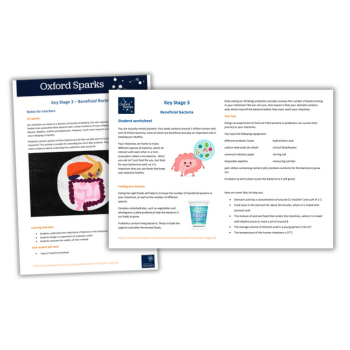This KS3 bacteria activity is suitable for extending more able students. Pupils need to plan an investigation to collect evidence before evaluating their data’s validity.
Our intestines are home to a diverse community of bacteria, the vast majority of which are beneficial. Studies have associated these bacteria with a lower incidence of many illnesses such as cancer, heart disease, diabetes, asthma and depression.
However, much more research is required to be certain of their role in keeping us healthy. Probiotics contain species of these bacteria but do they actually work to increase their population in our intestines?
KS3 bacteria learning objectives
- Understand the importance of bacteria in the intestines
- Design an experiment to evaluate a claim
- Evaluate the validity of their method
Starter activity
Present to the class an opinion – that the world would be better off without bacteria. Ask them to vote: if they agree they should put their hand up.
After voting, invite some students to explain the reason for their vote. Use this as a platform to discuss the fact that less than 5% of bacterial species cause disease (pathogenic).
In fact, we could not survive on Earth without bacteria. They play a vital role in decay, which is used to recycle materials and many species are vital to our health.
Play the animation ‘Bacteria Safari: The Forest on your Fingernail’, which outlines this in more detail as well as introducing the work of microbiologists at the University of Oxford.
Oxford Sparks is a portal for engaging with a wealth of exciting science taking place across Oxford University. Visit oxfordsparks.ox.ac.uk. You can also follow on X at @OxfordSparks.











